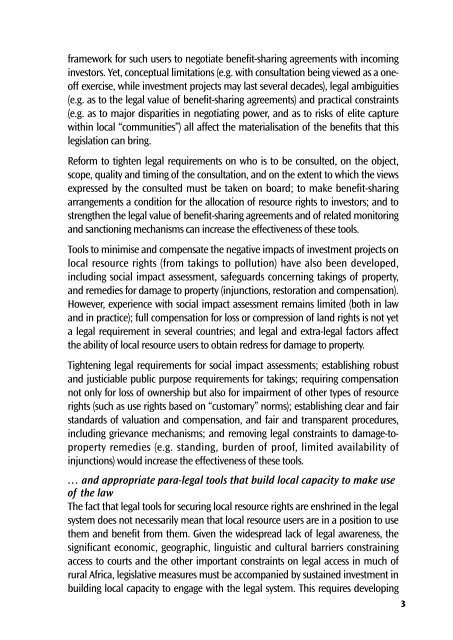Legal empowerment for local resource control
Legal empowerment for local resource control
Legal empowerment for local resource control
Create successful ePaper yourself
Turn your PDF publications into a flip-book with our unique Google optimized e-Paper software.
framework <strong>for</strong> such users to negotiate benefit-sharing agreements with incoming<br />
investors. Yet, conceptual limitations (e.g. with consultation being viewed as a oneoff<br />
exercise, while investment projects may last several decades), legal ambiguities<br />
(e.g. as to the legal value of benefit-sharing agreements) and practical constraints<br />
(e.g. as to major disparities in negotiating power, and as to risks of elite capture<br />
within <strong>local</strong> “communities”) all affect the materialisation of the benefits that this<br />
legislation can bring.<br />
Re<strong>for</strong>m to tighten legal requirements on who is to be consulted, on the object,<br />
scope, quality and timing of the consultation, and on the extent to which the views<br />
expressed by the consulted must be taken on board; to make benefit-sharing<br />
arrangements a condition <strong>for</strong> the allocation of <strong>resource</strong> rights to investors; and to<br />
strengthen the legal value of benefit-sharing agreements and of related monitoring<br />
and sanctioning mechanisms can increase the effectiveness of these tools.<br />
Tools to minimise and compensate the negative impacts of investment projects on<br />
<strong>local</strong> <strong>resource</strong> rights (from takings to pollution) have also been developed,<br />
including social impact assessment, safeguards concerning takings of property,<br />
and remedies <strong>for</strong> damage to property (injunctions, restoration and compensation).<br />
However, experience with social impact assessment remains limited (both in law<br />
and in practice); full compensation <strong>for</strong> loss or compression of land rights is not yet<br />
a legal requirement in several countries; and legal and extra-legal factors affect<br />
the ability of <strong>local</strong> <strong>resource</strong> users to obtain redress <strong>for</strong> damage to property.<br />
Tightening legal requirements <strong>for</strong> social impact assessments; establishing robust<br />
and justiciable public purpose requirements <strong>for</strong> takings; requiring compensation<br />
not only <strong>for</strong> loss of ownership but also <strong>for</strong> impairment of other types of <strong>resource</strong><br />
rights (such as use rights based on “customary” norms); establishing clear and fair<br />
standards of valuation and compensation, and fair and transparent procedures,<br />
including grievance mechanisms; and removing legal constraints to damage-toproperty<br />
remedies (e.g. standing, burden of proof, limited availability of<br />
injunctions) would increase the effectiveness of these tools.<br />
… and appropriate para-legal tools that build <strong>local</strong> capacity to make use<br />
of the law<br />
The fact that legal tools <strong>for</strong> securing <strong>local</strong> <strong>resource</strong> rights are enshrined in the legal<br />
system does not necessarily mean that <strong>local</strong> <strong>resource</strong> users are in a position to use<br />
them and benefit from them. Given the widespread lack of legal awareness, the<br />
significant economic, geographic, linguistic and cultural barriers constraining<br />
access to courts and the other important constraints on legal access in much of<br />
rural Africa, legislative measures must be accompanied by sustained investment in<br />
building <strong>local</strong> capacity to engage with the legal system. This requires developing<br />
3

















